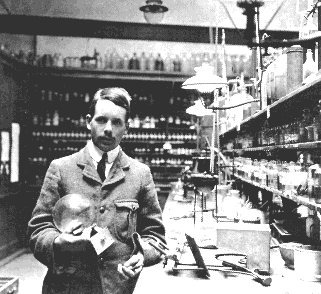'A Matter of Great Regret'

Physicist Henry Moseley was born on this day in 1887 in Weymouth, Dorset, England.
Oxford-educated, Moseley taught physics at Manchester under the famous Ernest Rutherford from 1910 to 1913 before returning to Oxford. In 1914, he began to study X-rays emitted by metals when bombarded by electrons. While Van den Broek had shown that wavelengths of X-rays emitted by metals varied in a regular manner from element to element, "Moseley's law" showed the precise form of the relationship, allowing for the determination of an "atomic number" for each element on the periodic table based on its nuclear charge. Moseley's discovery made it possible for the first time to create a meaningful ordering of the elements on the periodic table, and provided the tools necessary for physicists to look for previously undiscovered elements. Three new elements were discovered shortly after Moseley's law was unveiled: hafnium, rhenium and francium.
Within a year after his discovery, Moseley joined the British Army and was sent directly to the Eastern front of World War I, dying in the badly mishandled Battle of Gallipoli on August 10, 1915 at the age of 28.
Rutherford expressed his outrage. "To use such a man as a subaltern," he said, "is economically the equivalent to using the Lusitania to carry a pound of butter from Ramsgate to Margate." Even the Germans called Moseley's death "a matter of great regret."
Labels: Physicists





0 Comments:
Post a Comment
Subscribe to Post Comments [Atom]
<< Home